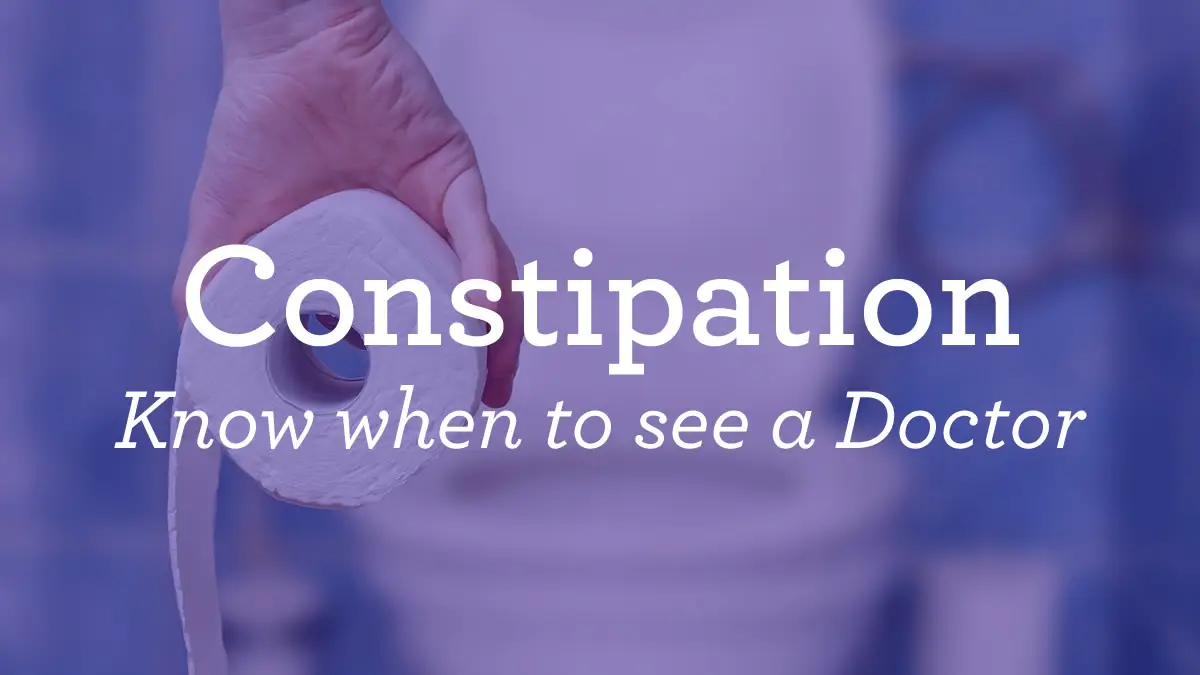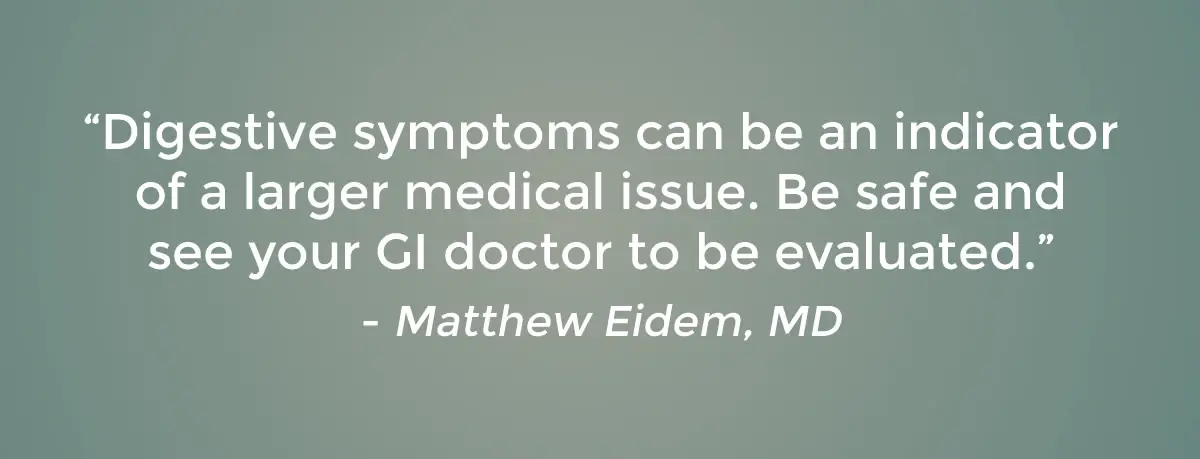Constipation can be disruptive and even painful. Sometimes it seems to hit from nowhere, making you more and more miserable. Or maybe you’ve been living with constipation for a couple of weeks now, but the over-the-counter stool softeners and laxatives are only a temporary fix. There’s usually a reason behind your constipation — sometimes minor, sometimes serious, so it’s a good idea to pay attention and figure out why your bowel movements have slowed down — what can it mean?
Constipation Doesn’t Just Mean That You Can’t Poop
Constipation is classified medically as infrequent, and often incomplete, bowel movements, but you may feel constipated if you’re experiencing difficulty passing stools, and feeling you have to strain on the toilet. Your poop may be harder and lumpier than before. Often the only marker is the difference you can feel between your old bowel movements and the discomfort you’re experiencing now.
You can experience constipation on an occasional basis, or on a more chronic, long term basis. Occasional constipation is nothing to be worried about — as long as you drink plenty of fluids and take a stool softener or osmotic laxative as recommended by your pharmacist. I recommend that you avoid stimulant laxatives as this type of laxative can become habit forming.
The Chronic Constipation Task Force from the American College of Gastroenterology defines chronic constipation as: “unsatisfactory defecation characterized by infrequent stool, difficult stool passage or both at least for previous 3 months.” As a long term condition, constipation can be painful, embarrassing, and hard to bear. Additionally, constipation can lead to hemorrhoids, rectal bleeding, anal fissure, fecal impaction, or rectal prolapse. Constipation can also be an early sign of a condition that’s more serious.
What Are the Main Causes of Constipation?
Most people experience constipation occasionally, but if it’s a common recurrence, there may be one or more causes behind your symptoms.
Causes of chronic constipation include:
- Taking certain medications, including but not limited to:
- Opioid pain relief such as morphine and codeine
- Tricyclic antidepressants such as amitriptyline
- Antihistamines
- Antacids and calcium supplements
- Iron supplements
- Blood pressure lowering drugs
- Anticonvulsants
- Oral contraceptives
- Existing medical conditions
- Pregnancy
- Diabetes
- Hypothyroidism or hyperparathyroidism
- Multiple sclerosis
- Stroke
- Spinal cord injury
- Parkinson’s disease
- Pelvic muscle issues
- Anismus — the inability to relax your pelvic muscles to pass a stool
- Dyssynergia — lack of coordination in your pelvic muscles
- Weak pelvic muscles
- Gastrointestinal blockages
- Anal fissure
- Bowel obstruction
- Bowel stricture — a narrowing of your colon
- Rectocele — where the rectum bulges through the back wall of your vagina
- Colon or rectal cancer
- Another internal cancer that is pressing on your colon
- Lifestyle factors
- Dehydration
- Little physical exercise
- A diet low in fiber
- Depression
Fortunately there are a number of actions you can take to improve your bathroom experience and ease your constipation.
Your First Line of Defense Against Constipation
I’d recommend looking at your lifestyle first of all, to see if there are any improvements you can make to reduce your constipation symptoms.
Consider making the following changes:
- Favor high fiber foods over low fiber, poor nutritional options such as convenience foods and unhealthy snacks. Go for plenty of veggies and fruits, beans, and bran. Fiber is indigestible for humans, and if you eat enough of it, it helps keep your gut moving.
- Drink plenty of water. When you increase your intake of fiber, it’s just as crucial to stay hydrated. Fluids help the fiber in your diet work better. Cutting out soda — even diet soda – and reducing intake of coffee can be beneficial. Caffeine is a diuretic, meaning it flushes water out of your body. Aim to drink eight glasses (8 ounces) of water a day.
- Get regular exercise. The exercise doesn’t have to be high impact — go for a walk around the block. Just make sure you get your body active every day. Exercise gets the muscles of your colon moving.
- Make sure you don’t hold in your poop — delayed defecation can mess with your body’s natural rhythm and cause constipation later. Listen to your body!
- In fact, make time for pooping — try to keep to a regular schedule, particularly after a meal.
- Do you best to manage any stress. Unfortunately, it can be a case of mind over matter — your mental state can have a real bearing on your physical state.
- If you are taking medication for one or more other conditions, it may be beneficial to go for a review with your doctor to check whether your constipation is medically induced. If so, it may be possible to switch to a different type of medication.
When an improved diet, increased water intake, and exercise don’t work, it may be tempting to turn to over-the-counter medications and supplements to ease your discomfort, but I’d be wary of taking these for any length of time for the treatment of constipation.
Instead, I can recommend a gentle laxative like Miralax. I often suggest Atrantíl to my patients struggling with bloating alongside their constipation — it works to rebalance your gut microbiome, easing the discomfort.
Signs You Need to See a Gastroenterologist for Constipation
Of course, there are reasons why it may be a good idea to seek a consult with a gastroenterologist in Plano, TX for your constipation.
Have you:
- Experienced a dramatic change in your bowel habits?
- Found blood on toilet paper or in the toilet bowl?
- Started a new medication and then started to feel constipated?
- Begun to lose weight dramatically?
- Struggled with these symptoms and constipation for more than three weeks?
- A family history of inflammatory bowel disease (IBD) or colon cancer?
If you are dealing with one or more of these symptoms, then I recommend booking an appointment with a gastroenterologist.
How a Gastroenterologist Evaluates Your Constipation
If you’re a patient with severe or chronic constipation, I will order some tests to evaluate for potential causes. These tests may include:
A blood test — checking your complete blood count, your metabolic profile, calcium levels, and thyroid stimulating hormone levels.
Colonoscopy — using a camera on the end of a flexible tube, I’m able to check for blockages or signs of colon cancer.
CT scan of abdomen and pelvis — taking an image of your gut, and other internal organs in that area of the body.
Barium or hypaque enema — an x-ray examination of the lower intestine.
Sitz marker studies — using tiny markers, I’m able to access the speed of the food moving through your gut.
What Are the Early Warning Signs of Bowel Cancer?
Unfortunately, a change in bowel movements, particularly a persistent one, can be a very early sign of bowel cancer. As it is crucial to detect bowel cancer as early as possible to stand the best chance of beating it, I must stress the importance of consulting a doctor about any recurring or chronic constipation you may be dealing with.
Other indications of bowel cancer include unexplained weight loss, extreme fatigue, bleeding from the anus or blood in your stool, and a pain or lump in your abdomen.
If you’re worried about your constipation symptoms and live in the Dallas-Fort Worth area, you can schedule an appointment through our website or by calling us at 972-867-0019.




